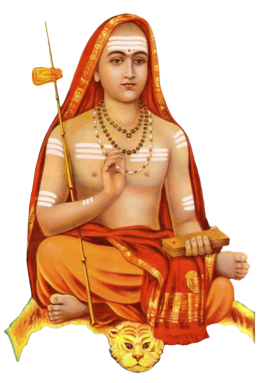वासनानां क्षयश्चातः स्वाध्यासापनयं कुरु ॥ २७७ ॥
vāsanānāṃ kṣayaścātaḥ svādhyāsāpanayaṃ kuru || 277 ||
तस्मात्सत्त्वमवष्टभ्य स्वाध्यासापनयं कुरु ॥ २७८ ॥
tasmātsattvamavaṣṭabhya svādhyāsāpanayaṃ kuru || 278 ||
धैर्यमालम्ब्य यत्नेन स्वाध्यासापनयं कुरु ॥ २७९ ॥
dhairyamālambya yatnena svādhyāsāpanayaṃ kuru || 279 ||
वासनावेगतः प्राप्तस्वाध्यासापनयं कुरु ॥ २८0 ॥
vāsanāvegataḥ prāptasvādhyāsāpanayaṃ kuru || 280 ||
क्वचिदाभासतः प्राप्तस्वाध्यासापनयं कुरु ॥ २८१ ॥
kvacidābhāsataḥ prāptasvādhyāsāpanayaṃ kuru || 281 ||
तदेकनिष्ठया नित्यं स्वाध्यासापनयं कुरु ॥ २८२ ॥
tadekaniṣṭhayā nityaṃ svādhyāsāpanayaṃ kuru || 282 ||
ब्रह्मण्यात्मत्वदार्ढ्याय स्वाध्यासापनयं कुरु ॥ २८३ ॥
brahmaṇyātmatvadārḍhyāya svādhyāsāpanayaṃ kuru || 283 ||
सावधानेन युक्तात्मा स्वाध्यासापनयं कुरु ॥ २८४ ॥
sāvadhānena yuktātmā svādhyāsāpanayaṃ kuru || 284 ||
तावन्निरन्तरं विद्वन्स्वाध्यासापनयं कुरु ॥ २८५ ॥
tāvannirantaraṃ vidvansvādhyāsāpanayaṃ kuru || 285 ||
क्वचिन्नावसरं दत्त्वा चिन्तयात्मानमात्मनि ॥ २८६ ॥
kvacinnāvasaraṃ dattvā cintayātmānamātmani || 286 ||
त्यक्त्वा चाण्डालवद्दूरं ब्रह्मीभूय कृती भव ॥ २८७ ॥
tyaktvā cāṇḍālavaddūraṃ brahmībhūya kṛtī bhava || 287 ||
विलाप्याखण्डभावेन तूष्णी भव सदा मुने ॥ २८८ ॥
vilāpyākhaṇḍabhāvena tūṣṇī bhava sadā mune || 288 ||
ब्रह्माण्डमपि पिण्डाण्डं त्यज्यतां मलभाण्डवत् ॥ २८९ ॥
brahmāṇḍamapi piṇḍāṇḍaṃ tyajyatāṃ malabhāṇḍavat || 289 ||
निवेश्य लिङ्गमुत्सृज्य केवलो भव सर्वदा ॥ २९0 ॥
niveśya liṅgamutsṛjya kevalo bhava sarvadā || 290 ||
तद्ब्रह्माहमिति ज्ञात्वा कृतकृत्यो भविष्यसि ॥ २९१ ॥
tadbrahmāhamiti jñātvā kṛtakṛtyo bhaviṣyasi || 291 ||
चिदद्वयानन्दमरूपमक्रियम् ।
तदेत्य मिथ्यावपुरुत्सृजेत
शैलूषवद्वेषमुपात्तमात्मनः ॥ २९२ ॥
cidadvayānandamarūpamakriyam |
tadetya mithyāvapurutsṛjeta
śailūṣavadveṣamupāttamātmanaḥ || 292 ||
Like an actor etc.—When the actor has played his part, he is simply a man. So the man of realisation is one with Brahman, his real Essence.
Vivekachudamani – Introduction
1: Devoted Dedication
2: Glory of Spiritual Life
3: Unique Graces in Life
4-7: Miseries of The Unspiritual Man
8-13: Means of Wisdom
14-17: The Fit Student
18-30: The Four Qualifications
31: Bhakti – Firm and Deep
32-40: Courtesy of Approach and Questioning
41-47: Loving Advice of the Guru
48-49: Questions of the Disciple
50: Intelligent Disciple – Appreciated
51-55: Glory of Self-Effort
56-61: Knowledge of the Self-Its Beauty
62-66: Direct Experience – Liberation
67-71: Discussion on Questions Raised
72-75: Gross Body
76-82: Sense Objects a Trap – Man Bound
83-86: Fascination for Body Criticised
87-91: Gross Body Condemned
92: Organs of Perception and Action
93-94: Inner Instruments
95: The Five Pranas
96-101: Subtle Body – Effects
102: Functions of Prāna
103-105: Ego Discussed
106-107: Infinite Love – the Self
108-110: Māyā – Pointed Out
111-112: Rajoguņa – Nature and Effects
113-116: Tamoguņa – Nature and Effects
117-119: Sattvaguņa – Nature and Effects
120-121: The Causal Body – Its Nature
122-123: Not-Self – Description
124-135: The Self – Its Nature
136: Advice for Self-control
137-142: What is Bondage – The Reply
143-144: The Powers – Agitation and Veiling
145-146: Bondage in Action
147-153: Ātman and Anātman – Discrimination
Negation of the Kośas
154-164: – Annamaya kośa (Food sheath)
165-166: – Prņamaya kośa (Vital air sheath)
167-183: – Manomaya kosa (Mental sheath)
184-188: – Vijnanamaya kośa (Intellectual sheath)
189-191: Ātman – Unattached
192-193: What is Liberation? – Disciple
194-206: Self-Knowledge gives Liberation
207-210: Anandamaya kośa (Bliss sheath)
211: Ātman – Other than the Five Kośas
212: What is Ātman? – Disciple
213-225: Nature of the Self – Discussion
226-236: All Manifestation Absolute
237-240: Brahman – Its Nature
241-249: That Thou Art – Explanation
250-253: Attitude in Meditation
254-266: Aids to Meditation
267-276: Give up Vāsanās – the Method
277-292: End Superimposition – The Means
293-297: The Perceived I’ Factor – False
298-309: Condemnation of the Ego
310-319: Actions, Thoughts and Vāsanās – Renounce
320-329: Total Vigilance – Its Price
330-338: In the One, No Plurality
339-348: Spiritual Growth – the Secret
349-353: Cause-Effect – False
354-372: Samadhi – Its Nature
373-378: Fully Detached – Samadhi Easy
379-383: Meditation – the Technique
384-397: Continuous Attention to Self
398-406: No Diversity in Reality
407-413: Ātma-vicāra – Contemplation
414-418: Give up Perceptions
419-425: The Science of Reality – Its Benefits
426-445: Signs of a Realised Seer
446-464: Prārabdha for a Saint
465-471: There is No Plurality
472-479: Experience of Selfhood
480-520: Practice of Knowledge – Disciple
521-575: Final Words of Advice
576-578: Blessed Disciple Liberated
579-581: The Glory of the Textbook

Vivekachudamani – Verses 277-292 – Vivekachudamani Verses 277-292 – By Adi Sankaracharya – In Sanskrit with English Meaning, Transliteration, Translation, Commenary, Lyrics, Audio – Vivekachudamani-277-292
